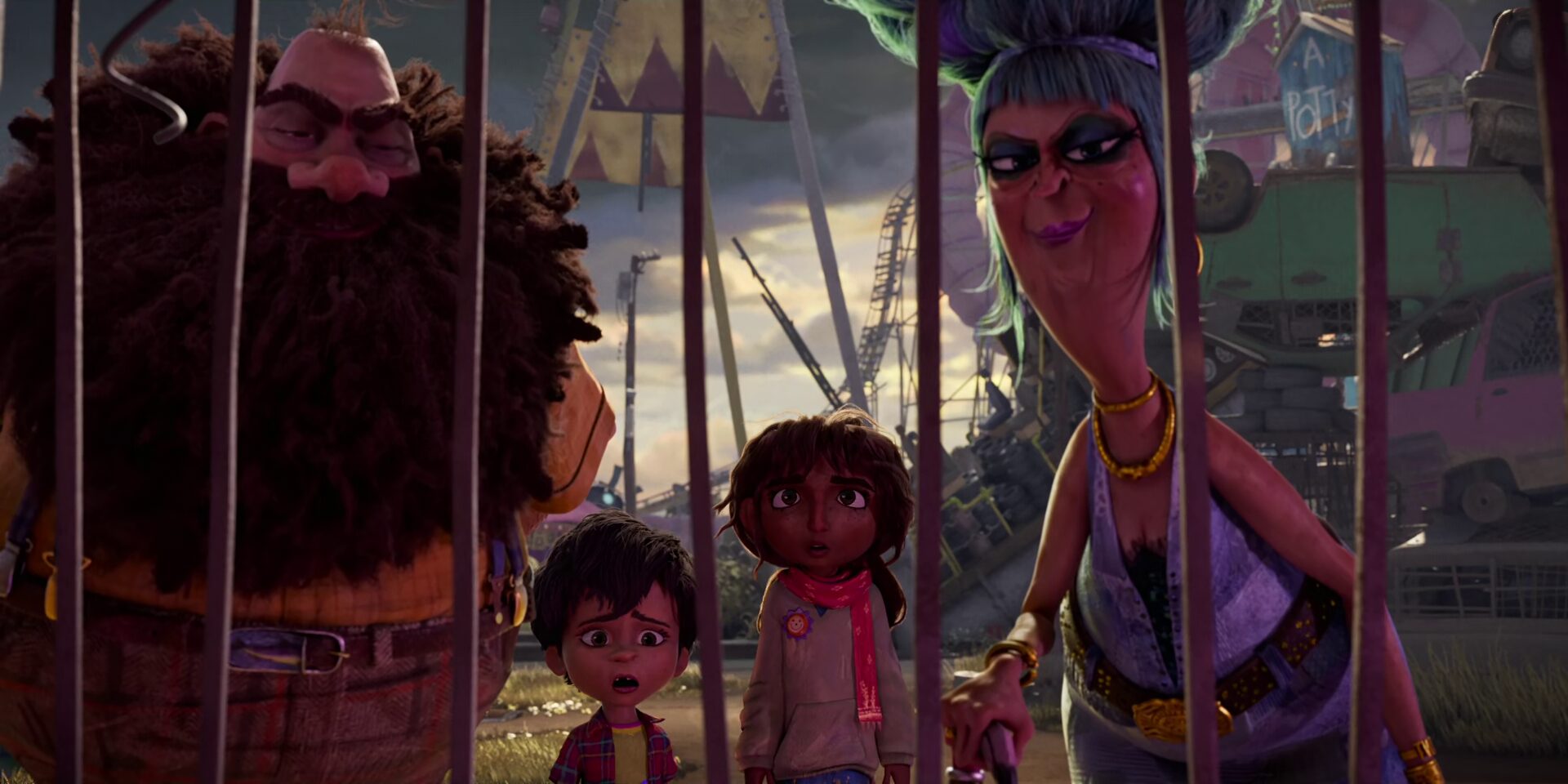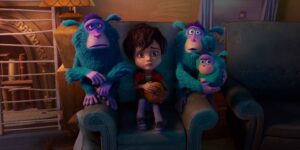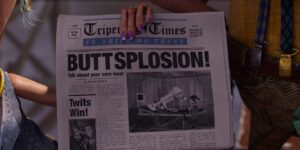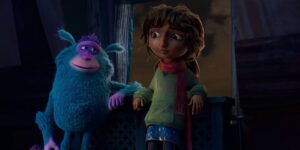


Who’s the most rotten couple in all the land? No matter how many celebrities or family members come to mind, the correct answer is The Twits – the gross pair brought to animated life for the first time by Netflix. Unfortunately, after an incredibly troubled development, Netflix has failed to capture the spirit of Roald Dahl in this version. It could possibly stand fine on its own as a film for children, especially ones who enjoy gross-out gags, but there isn’t much here for adults, and those who have read the original are far more likely to be insulted by the twists and turns that have been made to Dahl’s intentions to present the same message dozens of kids’ films, likely also available on Netflix, have done before.
 Somewhere in the mythical land of Triperot, a firefly is telling a story to her son. That framing device isn’t very important, but it’s there – I guess they don’t print Dahl books small enough for bugs (“What is this? A book for ANTS?!”), so she improvises a similar story. In the land of Triperot exist two orphans, Beesha and Bubsy, who want nothing more than to find loving homes of their own. However, their quiet lives are uprooted by an encounter with The Twits – a couple who love to torment one another, but more so anyone they can get to. When the orphans discover their evil plot involving the Muggle-Wumps, a group of colorful monkeys being tortured by the Twits for their planned theme park, they put themselves in danger for the sake of their town, and might just learn something along the way…maybe? More on that later.
Somewhere in the mythical land of Triperot, a firefly is telling a story to her son. That framing device isn’t very important, but it’s there – I guess they don’t print Dahl books small enough for bugs (“What is this? A book for ANTS?!”), so she improvises a similar story. In the land of Triperot exist two orphans, Beesha and Bubsy, who want nothing more than to find loving homes of their own. However, their quiet lives are uprooted by an encounter with The Twits – a couple who love to torment one another, but more so anyone they can get to. When the orphans discover their evil plot involving the Muggle-Wumps, a group of colorful monkeys being tortured by the Twits for their planned theme park, they put themselves in danger for the sake of their town, and might just learn something along the way…maybe? More on that later.
The Twits plays quite fast and loose with the original concept of the book – other than the Twits themselves and some carried over gags/winks to the book (such as Mr. Twit getting a glass eye in his beer), the orphans, Twitlandia, and the toad that’s desperate for someone to get high off of him – no exaggeration there – are completely new creations of the film. To an extent, this is understandable, as the original book is only 87 pages, so they had to add something major to make it a feature-length film. Disney had the rights to adapt The Twits twenty years ago, but it got stuck in development hell for long enough that it changed studios and even formats multiple times. If there’s any relief in how the movie actually turned out, it’s that Netflix didn’t go forward with its original plan to adapt it into a full series.
 An issue with The Twits is that its original characters, developed for the film, are nowhere near as interesting or worth rooting for as even The Twits themselves. While Beesha has the somewhat common development of learning how not to do everything on her own, the entirety of Bubsy’s character is “sad orphan.” Where’s a Flemco ad when you need one? The Twits certainly aren’t likable, but they have a few good gags, such as the confusion of “diorama” with “diarrhea”, and the oddly expensive choice of character actress Margo Martindale, who captures her role with the same brilliance she does in everything else…then again, you could be watching Bojack Horseman. Perhaps the smartest thing here is the bit of political satire, in which the Twits absurdly manage to become co-mayors of Triperot through tricky debates and political mudslinging…and by mudslinging, I mean a literal exploding butt. Bottom humor aside, part of me does question what kids are going to get out of that.
An issue with The Twits is that its original characters, developed for the film, are nowhere near as interesting or worth rooting for as even The Twits themselves. While Beesha has the somewhat common development of learning how not to do everything on her own, the entirety of Bubsy’s character is “sad orphan.” Where’s a Flemco ad when you need one? The Twits certainly aren’t likable, but they have a few good gags, such as the confusion of “diorama” with “diarrhea”, and the oddly expensive choice of character actress Margo Martindale, who captures her role with the same brilliance she does in everything else…then again, you could be watching Bojack Horseman. Perhaps the smartest thing here is the bit of political satire, in which the Twits absurdly manage to become co-mayors of Triperot through tricky debates and political mudslinging…and by mudslinging, I mean a literal exploding butt. Bottom humor aside, part of me does question what kids are going to get out of that.
A plus is that the animation style is nowhere near as gross as it could be—while the humor certainly leans into the gross-out, the film itself has some interesting character designs and a smart use of color to contrast the grimness of the world. That doesn’t necessarily mean you’ll want to watch the Twits romantically spit regurgitated worms in each other’s mouths – again, no exaggeration there – but it’s definitely not the worst-looking thing someone’s put out in the name of children’s entertainment with the excuse of “kids like gross things”.
 One of the most bewildering things about the film is its ending—in the clearest way to discuss without major spoilers, it’s confused by its own messaging, and definitely by the book’s. It’s possible that an executive somewhere thought Roald Dahl’s vision was too mean-spirited, but…The Twits are mean-spirited. Their entire goal in the film is chaos that could lead to destruction or the death of an entire orphanage, for all they care. Beesha about spells out the end of the original book – “The world will be a much better place without you two in it” – only for the film to say “actually, Roald Dahl was wrong, you should show radical empathy to animal torturers.” Absolutely not. Even if The Twits are better characters than the orphans themselves, Roald Dahl at least had an intention in making his story so mean-spirited – to show that being a knob your entire life has natural consequences. From the first few pages of the book, he tells young readers that having hatred in your heart makes you ugly – at the same time, he doesn’t empathize with people who refuse to grow. Netflix seems to exist in its own fairy tale. Perhaps they’ve got a guilty conscience?
One of the most bewildering things about the film is its ending—in the clearest way to discuss without major spoilers, it’s confused by its own messaging, and definitely by the book’s. It’s possible that an executive somewhere thought Roald Dahl’s vision was too mean-spirited, but…The Twits are mean-spirited. Their entire goal in the film is chaos that could lead to destruction or the death of an entire orphanage, for all they care. Beesha about spells out the end of the original book – “The world will be a much better place without you two in it” – only for the film to say “actually, Roald Dahl was wrong, you should show radical empathy to animal torturers.” Absolutely not. Even if The Twits are better characters than the orphans themselves, Roald Dahl at least had an intention in making his story so mean-spirited – to show that being a knob your entire life has natural consequences. From the first few pages of the book, he tells young readers that having hatred in your heart makes you ugly – at the same time, he doesn’t empathize with people who refuse to grow. Netflix seems to exist in its own fairy tale. Perhaps they’ve got a guilty conscience?
Overall, The Twits is a mess of Roald Dahl’s original book, with a few chuckleworthy moments and elements that feel like they could’ve shone in a new story. Margo Martindale certainly shines no matter what she’s in, but the plot itself feels padded and yet not fleshed out enough for its two main protagonists, with a confusing and frankly potentially harmful moral at the end. Don’t let hate consume you, sure, but don’t let it win. The original story is well worth a read, and in its ideal form, would’ve been a hand-drawn animated half-hour in the 90s that ran occasionally on Disney Channel. As it currently stands, though, Netflix’s The Twits is skippable, with plenty of better animated films bringing out stronger characters and morals.
The post Review: “The Twits”: Troubled Dahl Adaptation Better On The Page appeared first on Anime Superhero News.